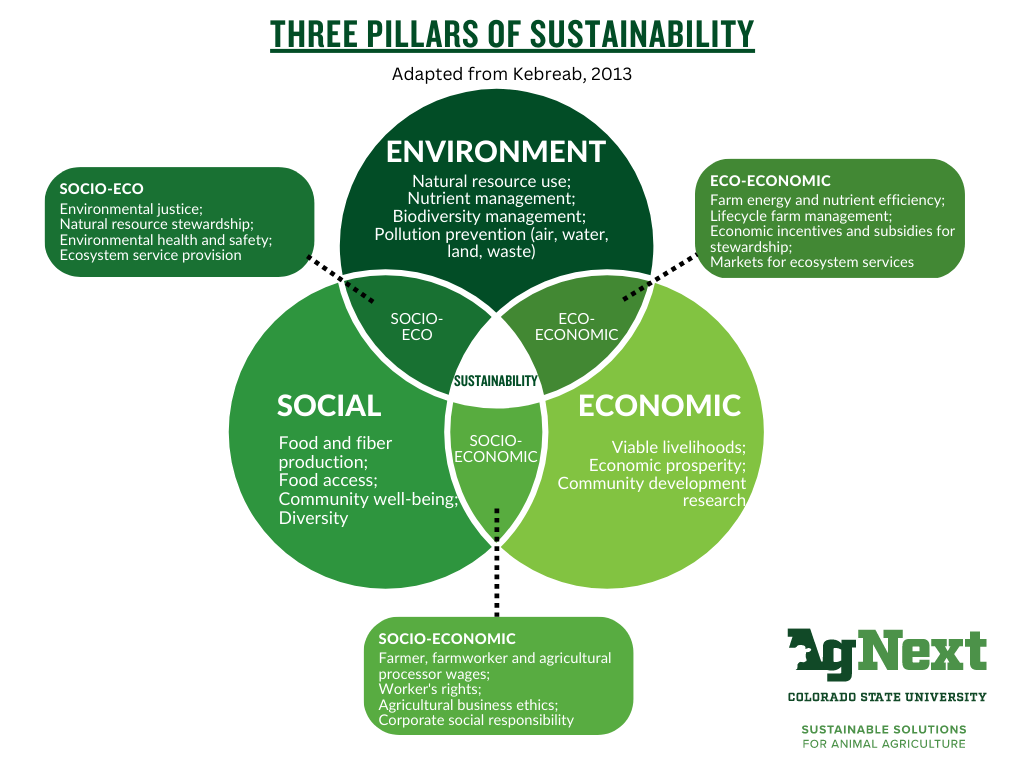Coordinating & Communicating Sustainability Efforts
A growing number of innovative farmers and scientists are moving toward farming systems that are more sustainable—environmentally, economically and socially. These systems use state-of-the-art, science-based practices that maximize productivity and profit while minimizing environmental damage. Sustainability also means the whole system is more resilient to droughts, floods, and other impacts of climate change that farmers are already seeing. A growing body of scientific evidence has shown that a more sustainable model can be just as productive and profitable over time—and can meet our needs for the long haul.
Sustainability has many facets. Environmental sustainability, for example, means good stewardship of the natural systems and resources that farms rely on. This includes:
- Building healthy soil and preventing erosion
- Managing water wisely
- Minimizing air and water pollution
- Storing carbon on farms
- Increasing resilience to extreme weather
- Promoting biodiversity
- Minimizing waste
 An economically and socially sustainable agriculture system is one that enables farms of all sizes to be profitable, care for their workforce and contribute to their local economies. By working with nature rather than against it, farms can avoid damaging environmental impacts without sacrificing productivity or profitability. And by prioritizing science that addresses the interconnectedness of environmental, economic and social factors, we can create a truly sustainable system.
An economically and socially sustainable agriculture system is one that enables farms of all sizes to be profitable, care for their workforce and contribute to their local economies. By working with nature rather than against it, farms can avoid damaging environmental impacts without sacrificing productivity or profitability. And by prioritizing science that addresses the interconnectedness of environmental, economic and social factors, we can create a truly sustainable system.
Over the past two decades, the produce industry’s concern with food safety, social responsibility, and now environmental sustainability has required produce companies to create systems to internally manage these challenges and also to demonstrate their compliance and improvements to external actors, including auditors and retail customers.
EFI’s certification program and the Ethical Charter Implementation Program provide tools for produce growers and suppliers to strengthen their management systems, data collection, and organizational culture related to social responsibility and labor practices. EFI conducted a needs assessment in late 2023 to better understand the current challenges and opportunities in the industry related to environmental sustainability. Based on what we learned, EFI will offer an introductory course, Sustainability 101: Coordinating & Communicating Sustainability Efforts this April & May 2024.
Sustainability 101 offers participants knowledge and tools to think critically about how environmental sustainability and climate science apply to the fresh produce industry, and how to best track and communicate the impact of sustainable practices. Topics include greenhouse gas emissions, biodiversity, soil health, energy use, and waste reduction, as well as information about policies, regulations, sustainability metrics, and reporting best practices for THESIS and Project Gigaton, and other common industry platforms.
“For fresh produce companies, effectively measuring and communicating sustainability efforts is not just a choice but a necessity to meet consumer and retailer demands, and to stay competitive in the market. The feedback we gathered from EFI-certified farms shows their commitment to the environment, and the need for clear, consistent sustainability tools and metrics for the specialty crop industry.”
Another impetus for EFI’s newest Sustainability 101 course is the successful pilot of The Produce and Reduce Program, where fresh produce companies worked with EFI and Measure to Improve to develop waste reduction plans to mitigate their emissions. Similarly to the pilot, Sustainability 101 will help companies to build their capacity and develop an actionable roadmap to identify, track, report, and strengthen their environmental sustainability efforts.
Written by Lilian Autler, Climate & Workforce Development Manager with EFI

